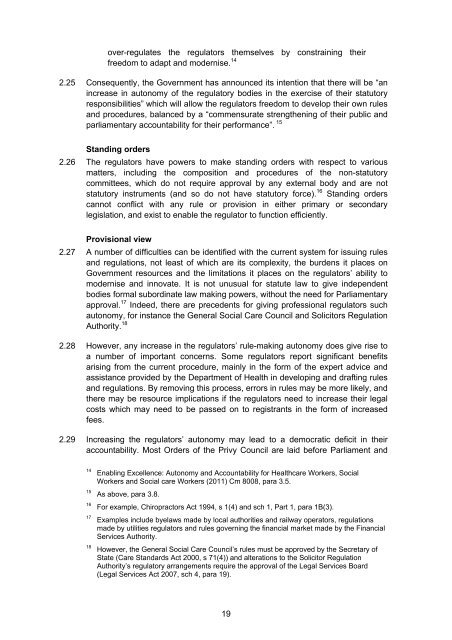Regulation of Health and Social Care Professionals Consultation
Regulation of Health and Social Care Professionals Consultation
Regulation of Health and Social Care Professionals Consultation
Create successful ePaper yourself
Turn your PDF publications into a flip-book with our unique Google optimized e-Paper software.
over-regulates the regulators themselves by constraining their<br />
freedom to adapt <strong>and</strong> modernise. 14<br />
2.25 Consequently, the Government has announced its intention that there will be “an<br />
increase in autonomy <strong>of</strong> the regulatory bodies in the exercise <strong>of</strong> their statutory<br />
responsibilities” which will allow the regulators freedom to develop their own rules<br />
<strong>and</strong> procedures, balanced by a “commensurate strengthening <strong>of</strong> their public <strong>and</strong><br />
parliamentary accountability for their performance”. 15<br />
St<strong>and</strong>ing orders<br />
2.26 The regulators have powers to make st<strong>and</strong>ing orders with respect to various<br />
matters, including the composition <strong>and</strong> procedures <strong>of</strong> the non-statutory<br />
committees, which do not require approval by any external body <strong>and</strong> are not<br />
statutory instruments (<strong>and</strong> so do not have statutory force). 16 St<strong>and</strong>ing orders<br />
cannot conflict with any rule or provision in either primary or secondary<br />
legislation, <strong>and</strong> exist to enable the regulator to function efficiently.<br />
Provisional view<br />
2.27 A number <strong>of</strong> difficulties can be identified with the current system for issuing rules<br />
<strong>and</strong> regulations, not least <strong>of</strong> which are its complexity, the burdens it places on<br />
Government resources <strong>and</strong> the limitations it places on the regulators’ ability to<br />
modernise <strong>and</strong> innovate. It is not unusual for statute law to give independent<br />
bodies formal subordinate law making powers, without the need for Parliamentary<br />
approval. 17 Indeed, there are precedents for giving pr<strong>of</strong>essional regulators such<br />
autonomy, for instance the General <strong>Social</strong> <strong>Care</strong> Council <strong>and</strong> Solicitors <strong>Regulation</strong><br />
Authority. 18<br />
2.28 However, any increase in the regulators’ rule-making autonomy does give rise to<br />
a number <strong>of</strong> important concerns. Some regulators report significant benefits<br />
arising from the current procedure, mainly in the form <strong>of</strong> the expert advice <strong>and</strong><br />
assistance provided by the Department <strong>of</strong> <strong>Health</strong> in developing <strong>and</strong> drafting rules<br />
<strong>and</strong> regulations. By removing this process, errors in rules may be more likely, <strong>and</strong><br />
there may be resource implications if the regulators need to increase their legal<br />
costs which may need to be passed on to registrants in the form <strong>of</strong> increased<br />
fees.<br />
2.29 Increasing the regulators’ autonomy may lead to a democratic deficit in their<br />
accountability. Most Orders <strong>of</strong> the Privy Council are laid before Parliament <strong>and</strong><br />
14 Enabling Excellence: Autonomy <strong>and</strong> Accountability for <strong>Health</strong>care Workers, <strong>Social</strong><br />
Workers <strong>and</strong> <strong>Social</strong> care Workers (2011) Cm 8008, para 3.5.<br />
15 As above, para 3.8.<br />
16 For example, Chiropractors Act 1994, s 1(4) <strong>and</strong> sch 1, Part 1, para 1B(3).<br />
17 Examples include byelaws made by local authorities <strong>and</strong> railway operators, regulations<br />
made by utilities regulators <strong>and</strong> rules governing the financial market made by the Financial<br />
Services Authority.<br />
18 However, the General <strong>Social</strong> <strong>Care</strong> Council’s rules must be approved by the Secretary <strong>of</strong><br />
State (<strong>Care</strong> St<strong>and</strong>ards Act 2000, s 71(4)) <strong>and</strong> alterations to the Solicitor <strong>Regulation</strong><br />
Authority’s regulatory arrangements require the approval <strong>of</strong> the Legal Services Board<br />
(Legal Services Act 2007, sch 4, para 19).<br />
19
















